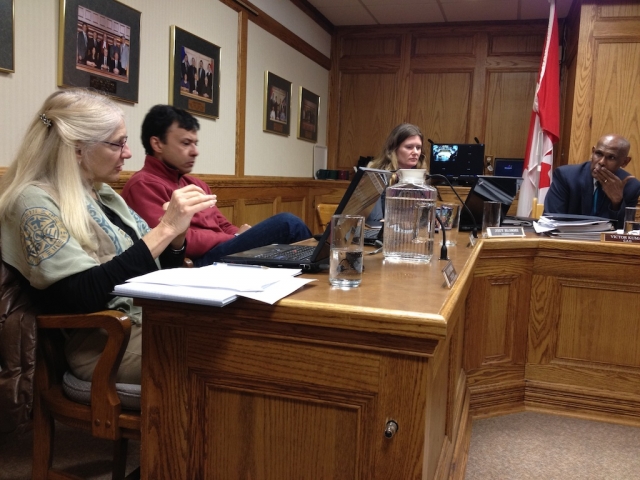Debate to expand the Aquatic Centre subsidy program stalled until summer
Council voted to delay debate on a policy amendment to expand the Trail Aquatic and Leisure Centre (TALC) subsidy program until after a plebiscite is held this summer.
The decision split council 4-3, with Moore, Coun. Jody Blomme, and Coun. Jill Spearn against. Coun. Cary Fisher was also against the delay at the beginning of the debate, but changed his mind.
Fisher noted that many Rosslanders had found “creative ways” to get TRP cards (Trail Resident Program) to receive the regular rate at TALC and avoid the double-fees charged to Rossland residents ever since Rossland and Trail failed to reach a cost-sharing agreement for the facility.
Rossland budgeted a $20,000 subsidy last year to reimburse certain TALC users—children, seniors, and people with special needs—the difference between Rossland and TRP fees.
Two weeks ago, council directed staff to review the TALC subsidy policy and the potential to expand eligibility to include all Rosslanders and to relax constraints on the non-profit societies who mediate the reimbursement.
At the same meeting, council agreed to hold a plebiscite—probably in June, with results processed by July—to ask Rosslanders about the importance of TALC to them, specifically to aid council to budget for any future negotiations with Trail.
Given the many Rosslanders with TRP cards, Fisher said, “I don’t know how we’d get an honest plebiscite, unless we had a wide open policy on people taking advantage of our own policy first … Why not open it up and see if that [$20,000] gets used?”
Staff had prepared a draft of just such a “wide open” policy for Monday’s meeting. Moore said, “We could do it now. It’s pretty darn easy to do.”
Two Rosslanders who have lobbied council to solve the impasse with Trail Recreation—Kari Kuznecov and Maya Kalmakov—asked council at the public input period to expand the subsidy “immediately.”
“The subsidy should be made available for all citizens who want to make use of TALC,” Kalmakov said. “I don’t believe it’s related to the plebiscite.” Waiting until the summer, she added, “will only delay equalizing [the fees].”
Kuznecov said a plebiscite would be a “waste of time and money” and council should “consider maybe not doing a plebiscite at this time. It doesn’t make sense.”
CAO Kumar said it’s “perfectly legal” to expand the subsidy program, but he also recommended that any decision be delayed until after the plebiscite, arguing that council would be “better informed” at that time.
Moore argued the opposite: if the policy were first expanded to be fully inclusive, the city would be armed with numbers from the subsidy program before going out to plebiscite. She said it was a legitimate way to gauge how many people are interested, and “it won’t be impacted by people who have TRP cards.” The findings, she figured, may be “more accurate than a plebiscite.”
Spearn said, “I’m in favour of finding some sort of solution for the residents of Rossland to use [TALC] without paying [the double fee].” For Spearn, June was not soon enough for the plebiscite, and she saw no conflict between the subsidy program and the plebiscite to justify a delay. “Maybe we’ll find we don’t need a plebiscite,” she said.
Blomme remarked, “[The subsidy program] gives us a new type of data to consider. The plebiscite is one kind of data, this is another.”
Mayor Greg Granstrom, however, was strongly opposed to expanding the policy before holding a plebiscite. He took it a step further, “If we expand the program without an agreement with Trail, who’s to say the [non-TRP TALC] fee isn’t tripled or quadrupled. This could turn out to be something of a quagmire.”
Moore disagreed. “We shouldn’t be fearful of expanding this policy because Trail might increase their fees,” she said.
Blomme said the “dynamic” of Trail’s double fees and Rossland’s subsidy exists now, so increasing the program “shouldn’t be a problem.”
Kumar asked council to consider if the move might “undermine” TALC, and clearly intimated that he did not favour the expanded policy.
Moore disagreed again, “It’s not undermining. We’re not offering to pay less or pay different, it’s win-win,” she said, with Trail earning greater revenues and more Rosslanders choosing to use TALC.
Both the mayor and Coun. Kathy Wallace were concerned that the program—of which only $12,000 was used by children, seniors, and people with special needs last year—might become so popular when expanded to the entire public that the $20,000 budget would be exhausted before the year was up.
Moore did not see a problem in this “first come first served” approach to the subsidy. She said it would be as simple as letting people know that the subsidy program was limited and might run out. She added that council could later increase the budget if the subsidy were deemed popular enough.
Wallace said, “We have to provide service fairly and equitably,” and likened the ‘while supplies last’ approach to “throwing money in a pool [and] whoever dives in first gets it.”
Moore countered, “We’re trying to be inclusive, that’s the whole point. The intent initially was to help citizens use the facility on an equal basis.”
Spearn was troubled by people “going under the radar” and undermining the system with “untruthful and underhanded” means of acquiring TRP cards. “I don’t want to force our citizens to be underhanded when we can provide a policy that is open and inclusive.”
Thatcher said his question—”do citizens want us to subsidize these groups or send [[the money] down the hill?”—would be better answered by a plebiscite.
By the debate’s end, Fisher was swayed and voted to delay any debate on an expanded subsidy policy until after plebiscite results are back. The plebiscite question or questions are not yet known.


























